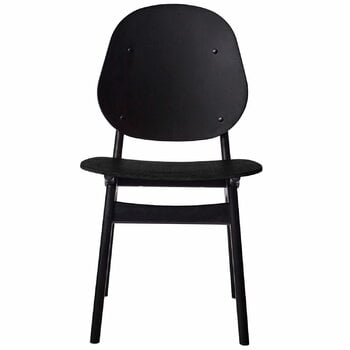Noble chair is a distinctive wooden dining chair that came out the first time in 1959 and has now been re-released by Warm Nordic. Designed by Arne Hovmand-Olsen, Noble chair is characterized by organic shapes, wood grain patterns and a noble spirit. The chairs settle into beautiful groups by a dining table and add a delightful element to the interior also individually.
Noble chair, black lacquered beech
Warm Nordic
Description
Noble chair is a distinctive wooden dining chair that came out the first time in 1959 and has now been re-released by Warm Nordic. Designed by Arne Hovmand-Olsen, Noble chair is characterized by organic shapes, wood grain patterns and a noble spirit. The chairs settle into beautiful groups by a dining table and add a delightful element to the interior also individually.
Product details (6)
- Colour
- Black
- Width
- 48 cm
- Depth
- 55 cm
- Height
- 85 cm
- Material
- Lacquered solid beech
- Seat material
- Veneer
- Product ID
Designer
Danish furniture designer Arne Hovmand-Olsen (1919-1989) started his career in 1938 as a cabinetmaker for P.Olsen Sibast. After studying furniture design in a technical school, Hovmand-Olsen founded his own workshop with great success – his designs gained success not only in Denmark but also internationally, especially in the United States.
Read moreReviews (0)
Sustainability
The Product Sustainability Framework, our criteria of sustainable design, helps you find the most sustainable products in our selection. Read below which sustainability criteria this product has met.
Working conditions & labour 9/9
-
Equal opportunities for all employees
-
Commitment to UN Global Compact, fair compensation for all employees
-
Corporate responsibility requirements defined and communicated for suppliers
-
Systematic work for improved inclusion and well-being in the workplace
-
Transparent supply chain
-
Suppliers' compliance to a code of conduct ensured
-
Direct suppliers audited and certified
-
Compliance to the UN Guiding Principles on Business and Human Rights ensured in the supply chain
-
Support for community involvement in the supply chain
Eco-friendly production 7/9
-
Fair and resource-wise water-use in production
-
No incineration or landfilling of returned items
-
No use of endangered species as materials
-
No direct environmental emissions or waste (excl. GHGs) from production
-
Material-efficient and ecological packaging
-
Positive impact on nature’s well-being through operations that regenerate natural ecosystems
-
No potentially harmful chemicals used in own production
Climate impact 4/8
-
Company's direct greenhouse gas emissions identified and commitment to reduction
-
Product's carbon impact identified and commitment to reduction
-
Guidance on energy- and eco-efficient use of the product
-
Contribution to climate initiatives beyond the brand’s direct operations
Sustainable materials 4/6
-
Sustainable and long-lasting material choices
-
No harmful or hazardous substances
-
Responsible raw material sourcing and production
-
Materials suited for circularity: monomaterials, recyclable finishings, renewable or recycled contents etc.
Circular design 4/5
-
High aesthetic quality promoting long-term use of the product
-
Technically durable product design and material choices
-
Design for enduring life-long quality
-
Design and support for product maintenance, repair and upgradability







